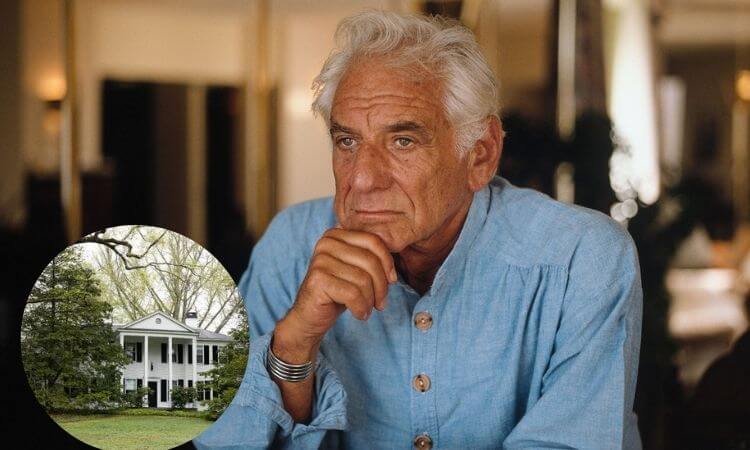Table of Contents
What Was Leonard Bernstein’s Net Worth?
Leonard Bernstein remains one of the most influential figures in American music history. As a celebrated composer, conductor, author, pianist, and music lecturer, his contributions to the arts have left an indelible mark. When his death in 1990, Bernstein’s net worth was estimated to be $10 million, equivalent to approximately $22 million in today’s dollars. This article delves into Bernstein’s financial legacy, exploring his earnings, estate, charitable contributions, and the lasting impact of his wealth on the world of music and beyond.
Early Life
Leonard Bernstein was born Louis Eliezer Bernstein on August 25, 1918, in Lawrence, Massachusetts. His parents, Samuel and Jennie Bernstein, were Jewish immigrants from Rivne, a city that was part of Poland during their immigration but is now located in Ukraine. Growing up in a modest household in Boston, Leonard was the eldest of three children, with younger siblings Burton and Shirley. His father owned The Samuel Bernstein Hair and Beauty Supply Company, providing the family with a stable, albeit modest, income.
Leonard’s musical journey began early. At the age of 10, his aunt moved her piano to the Bernstein home, sparking his interest in music. He taught himself to play before taking formal piano lessons. By his teenage years, Bernstein was attending orchestral concerts with his father, and in 1932, he gave his first public performance, playing Brahms’ “Rhapsody in G minor” at a recital at the New England Conservatory. His educational path led him to the William Lloyd Garrison School and the Boston Latin School, followed by Harvard College, where he graduated cum laude with a Bachelor of Arts degree in 1939. He further honed his musical talents at the Curtis Institute of Music in Philadelphia, studying piano, conducting, orchestration, counterpoint, and score reading.
MUST READ: How much is Steve Spitz Net Worth 2024? All You Need to Know
Career Achievements
Leonard Bernstein’s career was marked by a series of groundbreaking achievements in various facets of music and the arts.
Musical Contributions
Bernstein’s versatility as a musician was evident early on. After moving to New York City, he worked as a piano teacher, coached singers, played piano for Carnegie Hall dance classes, and transcribed music for Harms-Witmark. His conducting debut with the New York Philharmonic in 1943 marked the beginning of a prolific conducting career that would span numerous orchestras across North America and beyond.
In the mid-1940s, Bernstein collaborated with Jerome Robbins on the ballet “Fancy Free,” which was later expanded into the Broadway musical “On the Town.” His role as the music director of the New York City Symphony from 1945 to 1947 further solidified his reputation as a leading conductor. By the 1950s, Bernstein had become the music director of the New York Philharmonic, a position he held with distinction.
Bernstein’s contributions to musical theatre are equally noteworthy. He composed the scores for several iconic Broadway musicals, including “West Side Story,” “Candide,” “Peter Pan,” “On the Town,” and “Wonderful Town.” “Wonderful Town” won a Tony Award for Best Musical in 1953, and Bernstein himself received a Special Tony Award in 1969. His work extended beyond theatre; he composed “Mass,” a theatrical work commissioned for the inauguration of the John F. Kennedy Center for the Performing Arts in Washington, D.C.
Books and Lectures
In addition to his musical endeavors, Bernstein was a prolific author and educator. He authored several books, including “Findings” (1993), “The Infinite Variety of Music” (1993), “The Joy of Music” (2004), and “Young People’s Concerts” (2006). His commitment to music education was further demonstrated through his “Young People’s Concerts” series, which brought classical music to a broader audience.
Bernstein also served as a professor of poetry at Harvard from 1972 to 1973, when he presented the “The Unanswered Question” lecture series. These lectures were broadcast on PBS in 1976 and later published as a book, showcasing his ability to communicate complex musical ideas to the public.
Awards and Recognitions
Bernstein’s excellence was recognized through numerous awards and honors. He received over 60 Grammy nominations, winning 16 of them, and earned seven Emmy Awards. His achievements extended to the stage, where he was inducted into the American Theater Hall of Fame and the Television Hall of Fame. In 1980, Bernstein was honored with the Kennedy Center Honors, a testament to his significant contributions to American culture.

Internationally, Bernstein received Denmark’s Sonning Award in 1965 and Italy’s Knight Grand Cross Order of Merit in 1989. He was appointed a Commandeur de la Légion d’honneur by the French government in 1986. In 1987, he was honored with the Ernst von Siemens Music Prize, the Edward MacDowell Medal, and the Royal Philharmonic Society Gold Medal. Bernstein’s legacy also includes his induction into Chicago’s Legacy Walk in 2015, celebrating his lasting impact on the arts.
Personal Life
Leonard Bernstein’s personal life was as complex and multifaceted as his professional career. On September 9, 1951, he married actress Felicia Montealegre, and together they had three children: Alexander, Nina, and Jamie. Their marriage, however, was marked by Bernstein’s romantic involvement with both women and men throughout his life. Felicia once candidly wrote to Bernstein, acknowledging his homosexuality and expressing concerns about his need for a certain sexual pattern for his peace of mind and health.
In 1976, Bernstein left Felicia to live with music scholar Tom Cothran in Northern California. However, when Felicia was diagnosed with lung cancer in 1977, Bernstein returned to her side and remained with her until her death in June 1978.
Beyond his family, Bernstein was deeply involved in humanitarian and political causes. He actively participated in Vietnam War protests and the civil rights movement. His political activism led the FBI to monitor him in the 1940s for alleged ties to communist organizations. Bernstein accessed his FBI file in the 1980s through the Freedom of Information Act, discovering it was over 800 pages long.
In 1970, Bernstein and Felicia hosted a fundraising event for the defense of Black Panther Party members at their Manhattan apartment. This act of support led to them receiving hate mail and their building being picketed by protesters from the Jewish Defense League.
Financial Legacy
Net Worth at Death
At the time of his passing in 1990, Leonard Bernstein’s net worth was estimated to be $10 million. Adjusted for inflation, this amount equates to roughly $22 million in today’s dollars. Bernstein’s wealth was amassed through his diverse career as a composer, conductor, performer, author, and educator. His numerous awards, including Grammy, Emmy, and Tony Awards, as well as his involvement in high-profile projects like “West Side Story,” significantly contributed to his financial success.
Estate and Will
Leonard Bernstein’s will outlined the distribution of his estate, ensuring that his legacy would continue to support his family and charitable causes. His estate was left to his three adult children, who were to hold it in trust. The income from the estate was to be distributed quarterly, providing ongoing financial support to his heirs.
Charitable Contributions
Bernstein was known for his generosity and commitment to philanthropy. In his will, he made a substantial donation of $1 million to his charity, the Spring Gate Corp. Additionally, in 1990, he received the Praemium Imperiale, a lifetime achievement award from the Japan Arts Association, which included a $100,000 prize. Bernstein used this prize money to establish the Leonard Bernstein Center for Education Through the Arts in Nashville, which opened in 1992. This center exemplifies Bernstein’s dedication to using his wealth to further education and the arts.
Death and Legacy
Leonard Bernstein’s life came to an untimely end when he died of a heart attack on October 14, 1990, at the age of 72. The heart attack was a result of mesothelioma, a condition linked to his heavy smoking habits that also led to emphysema in his mid-50s. He passed away in his New York City apartment, five days after announcing his retirement from conducting.
Bernstein was laid to rest next to his wife Felicia at Brooklyn’s Green-Wood Cemetery. In a poignant tribute, the score of Mahler’s Fifth Symphony was placed over his heart, symbolizing his deep connection to classical music.
His legacy continues to be celebrated through various exhibitions and media. In 2018, L.A.’s Skirball Cultural Center presented “Leonard Bernstein at 100,” an exhibition curated by the GRAMMY Museum that featured over 150 objects from his life and career. In September 2023, the film “Maestro,” which explores the relationship between Leonard and Felicia, premiered at the Venice International Film Festival. The film, featuring Bradley Cooper as Bernstein, garnered a nomination for Best Film, further cementing Bernstein’s enduring influence on both the arts and popular culture.
Awards and Honors
Leonard Bernstein’s illustrious career was decorated with numerous awards and honors that recognized his exceptional contributions to music and the arts:
- Grammys: Over 60 nominations with 16 wins.
- Emmys: Seven awards.
- Tonys: Two awards, including a Special Tony Award in 1969.
- Academy Award Nomination: Best Music, Scoring of a Dramatic or Comedy Picture for “On the Waterfront” in 1955.
- American Academy of Arts and Sciences: Named a Fellow in 1951.
- MacDowell Residency: Fellow in 1962, 1970, and 1972.
- Ditson Conductor’s Award: 1958.
- Sonning Award: Denmark, 1965.
- George Peabody Medal: Johns Hopkins University, 1980.
- Ernst von Siemens Music Prize: 1987.
- Edward MacDowell Medal: 1987.
- Royal Philharmonic Society Gold Medal: 1987.
- Commandeur de la Légion d’honneur: France, 1986.
- Knight Grand Cross Order of Merit: Italy, 1989.
- Legacy Walk: Chicago, 2015.
- Kennedy Center Honors: 1980.
These accolades reflect Bernstein’s profound impact on the world of music, his excellence as a conductor and composer, and his dedication to music education and humanitarian causes.
Conclusion
Leonard Bernstein’s net worth at the time of his death, while substantial, was only a part of his broader legacy. His financial success enabled him to support his family, contribute to charitable causes, and establish institutions that continue to promote education and the arts. Bernstein’s multifaceted career, marked by groundbreaking achievements and a commitment to social causes, ensured that his influence extended far beyond his lifetime. His enduring legacy is celebrated through his music, writings, and the countless lives he touched through his philanthropic efforts. Leonard Bernstein remains a towering figure in the annals of American music, and his financial legacy serves as a testament to his dedication to enriching the cultural landscape.


